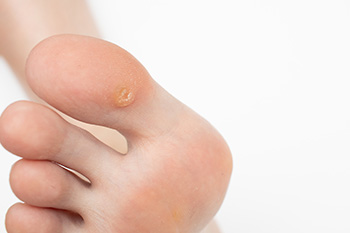
Plantar warts are common viral skin infections that occur on the soles of the feet, caused by the human papillomavirus, abbreviated HPV. These warts often appear as small, rough growths that can be painful when pressure is applied, such as during walking or standing. Characteristically, plantar warts may have tiny black dots on their surface, which are actually small, clotted blood vessels. The skin around the wart may become thickened or callused due to the constant friction and pressure. In some cases, plantar warts can cluster together to form mosaic warts, which can be particularly difficult to treat. Symptoms can include tenderness and discomfort, particularly when the wart is located on a weight-bearing area of the foot. The majority of people experience pain while walking with plantar warts. If this applies to you, it is suggested that you consult a podiatrist who can offer you effective relief and treatment solutions.
Plantar warts can be very uncomfortable. If you need your feet checked, contact Mohammad R. Parsa, DPM from Madison Foot Clinic. our doctor will assist you with all of your foot and ankle needs.
About Plantar Warts
Plantar warts are the result of HPV, or human papillomavirus, getting into open wounds on the feet. They are mostly found on the heels or balls of the feet.
While plantar warts are generally harmless, those experiencing excessive pain or those suffering from diabetes or a compromised immune system require immediate medical care. Plantar warts are easily diagnosed, usually through scraping off a bit of rough skin or by getting a biopsy.
Symptoms
- Lesions on the bottom of your feet, usually rough and grainy
- Hard or thick callused spots
- Wart seeds, which are small clotted blood vessels that look like little black spots
- Pain, discomfort, or tenderness of your feet when walking or standing
Treatment
- Freezing
- Electric tool removal
- Laser Treatment
- Topical Creams (prescription only)
- Over-the-counter medications
To help prevent developing plantar warts, avoid walking barefoot over abrasive surfaces that can cause cuts or wounds for HPV to get into. Avoiding direct contact with other warts, as well as not picking or rubbing existing warts, can help prevent the further spread of plantar warts. However, if you think you have developed plantar warts, speak to your podiatrist. He or she can diagnose the warts on your feet and recommend the appropriate treatment options.
If you have any questions please feel free to contact our office located in Madison, MS . We offer the newest diagnostic and treatment technologies for all your foot and ankle needs.
